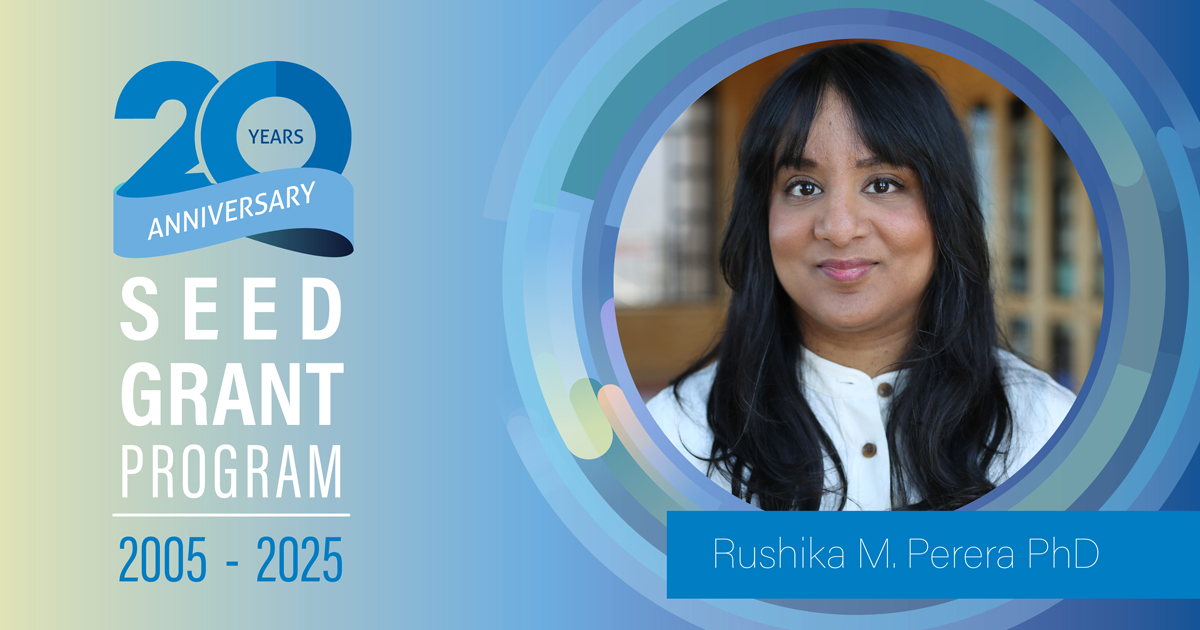Since 2005, our Seed Grant Program has fostered an environment where research can bloom. As we mark 20 years since our first cohort of grantees, it is inspiring to reflect on the impact of our early support and see all that is being accomplished.
Rushika Perera, PhD, exemplifies the enduring impact of the Hirshberg Foundation’s Seed Grant Program. Initially awarded a Seed Grant in 2014 as a senior postdoctoral fellow at Massachusetts General Hospital and Harvard Medical School, Dr. Perera has a remarkable career of distinguished honors, mentorship, and scientific discovery.
In 2015, Dr. Perera joined UC San Francisco as an Assistant Professor and established the Perera Lab to investigate how pancreatic ductal adenocarcinoma (PDAC) cells survive and grow. Her lab has shown that PDAC thrives in nutrient-poor, hypoxic environments by altering nutrient acquisition and utilization pathways such as autophagy and macropinocytosis. Her team continues to explore the mechanisms of autophagy-lysosome activation and how this organellar system contributes to cellular plasticity, adaptation to stress, and metabolic reprogramming in pancreatic cancer.
“The Seed Grant was instrumental in allowing me to generate critical preliminary data that served as the foundation for larger grant applications,” she said. “It gave me the freedom to be bold and follow the science.”
This early career grant helped collect preliminary data that was instrumental for securing major research funding. Dr. Perera has since received three National Institute of Health (NIH) R01 grants, an NIH Director’s New Innovator Award, and prestigious recognitions from the Damon Runyon Cancer Research Foundation and the American Association for Cancer Research (AACR). Today, she is the Deborah Cowan Endowed Associate Professor at the School of Medicine, Vice Chair of the Anatomy Department, and Chief Scientific Officer of the UCSF Pancreatic Cancer Program, leading transformative research in pancreatic cancer biology.
The Perera Lab is at the intersection of cell biology and oncology, seeking to uncover new therapeutic targets by understanding how cancer cells hijack stress response pathways. Her latest publication in Nature identifies a key protein, PCSK9, as a driver in determining whether cells spread to the liver or lungs, offering potential new avenues to prevent and treat metastases.
Our Seed Grant Program empowers innovative scientists like Dr. Perera to chase bold ideas and inspire future leaders. Her accomplishments, and mentorship of the next generation, highlight the power of early career support. Early investment paves the way for future breakthroughs.
Thanks to your support, we’ve been planting seeds of hope through our Seed Grant Program for 20 years. These seeds continue to accelerate discoveries that bring hope to those facing pancreatic cancer. It is more crucial than ever to move Beyond the Seed: Bridge to Breakthrough. Private funding is the driver that will transform outcomes for patients and families.
Help us continue to sow seeds of hope for a cancer-free future, donate today


